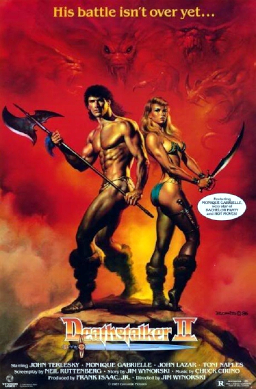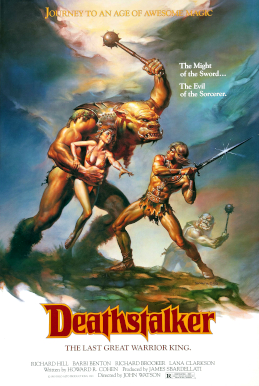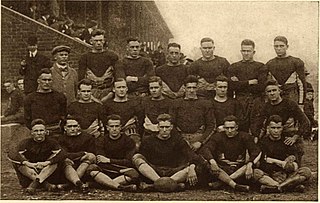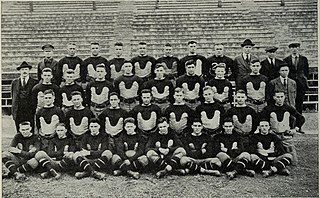Related Research Articles

Deathstalker II, also known as Deathstalker II: Duel of the Titans, is a 1987 Argentine-American fantasy comedy-adventure film directed by Jim Wynorski and a sequel to 1983's Deathstalker. It was written by Neil Ruttenberg and starring John Terlesky, Monique Gabrielle, John LaZar and María Socas. Terlesky replaced Rick Hill, the protagonist from the previous film, in the starring role of Deathstalker. This is the last sword and sorcery movie that Roger Corman produced in Argentina during the 80s.

Deathstalker, also known as El cazador de la muerte, is a 1983 Argentine-American sword and sorcery film directed by James Sbardellati, and starring Rick Hill, Barbi Benton, Bernard Erhard and Lana Clarkson.

George Everett Strupper Jr., known variously as "Ev" or "Strup" or "Stroop" was an American football player. He played halfback for Georgia Tech from 1915 to 1917. Strupper overcame deafness resulting from a childhood illness and was selected as an All-American in 1917.

The Georgia Tech Yellow Jackets baseball team represents the Georgia Institute of Technology in NCAA Division I college baseball. Along with most other Georgia Tech athletic teams, the baseball team participates in the Atlantic Coast Conference. The Yellow Jackets play their home games in Russ Chandler Stadium and they are currently coached by Danny Hall.
The 1941 Georgia Bulldogs football team was an American football team that represented the University of Georgia as a member of the Southeastern Conference during the 1941 college football season. In their third season under head coach Wally Butts, the team compiled a 9–1–1 record, finished third in the SEC, outscored opponents by a total of 319 to 85, and defeated TCU in the 1942 Orange Bowl. The team played its home games at Sanford Stadium in Athens, Georgia, and at Ponce de Leon Park and Grant Field in Atlanta.
The 1942 Georgia Bulldogs football team was an American football team that represented the University of Georgia in the Southeastern Conference (SEC) during the 1942 college football season. In their fourth season under head coach Wally Butts, the Bulldogs compiled an 11–1 record, shut out six of twelve opponents, won the SEC championship, and outscored all opponents by a total of 378 to 73. The Bulldogs' 75–0 win over Florida remains the largest margin of victory in the history of the Florida–Georgia football rivalry.
New Concorde (NC) is an American Los Angeles, California based film distribution company founded by Roger Corman. NC got its start in 1983 when Corman formed the production and distribution Concorde-New Horizons (CNH) as one of the first production companies to develop and take advantage of video as a distribution tool.

Deathstalker IV: Match of Titans, also called Deathstalker IV: Match of the Titans, is a 1991 sword and sorcery fantasy film written and directed by Howard R. Cohen. Rick Hill, who played the title role in the first film, reprises his role in this film. It is the fourth and final installment in the Deathstalker tetralogy.

The 1917 Georgia Tech Golden Tornado football team represented the Georgia Institute of Technology in American football during the 1917 Southern Intercollegiate Athletic Association football season. The Golden Tornado, coached by John Heisman in his 14th year as head coach, compiled a 9–0 record and outscored opponents 491 to 17 on the way to its first national championship. Heisman considered the 1917 team his best, and for many years it was considered "the greatest football team the South had ever produced". The team was later named national champion by the Billingsley Report, Helms Athletic Foundation, Houlgate System, and National Championship Foundation.

The 1918 Georgia Tech Golden Tornado football team represented the Georgia Institute of Technology during the 1918 Southern Intercollegiate Athletic Association football season. The Tornado was coached by John Heisman in his 15th year as head coach, compiling a record of 6–1 and outscoring opponents 466 to 32. Georgia Tech played its home games at Grant Field.

The 1917 College Football All-Southern Team consists of American football players selected to the College Football All-Southern Teams selected by various organizations for the 1917 Southern Intercollegiate Athletic Association football season. Georgia Tech won the SIAA and the south's first national championship. Walker Carpenter and Everett Strupper were the first two players from the Deep South selected first-team All-American.

The 1920 Georgia Tech Golden Tornado football team represented the Georgia Tech Golden Tornado of the Georgia Institute of Technology during the 1920 Southern Intercollegiate Athletic Association football season. The Tornado was coached by William Alexander in his first year as head coach. The team compiled a record of 8–1, outscored opponents 312 to 16, and tied for first place with Georgia and Tulane in the Southern Intercollegiate Athletic Association (SIAA).

The 1915 Georgia Tech Yellow Jackets football team represented the Georgia Tech Golden Tornado of the Georgia Institute of Technology during the 1915 college football season. The Tornado was coached by John Heisman in his 12th year as head coach, compiling a record of 7–0–1 and outscoring opponents 233 to 24. Georgia Tech played its home games at Grant Field. The Tech team claims a Southern championship, and had what was then the greatest season in its history.

The 1904 Georgia Tech football team represented the Georgia Institute of Technology during the 1904 Southern Intercollegiate Athletic Association football season. This is the first year for Georgia Tech under coach John Heisman. Lob Brown was the school's first consensus All-Southern player.

The 1906 Georgia Tech Yellow Jackets football team represented the Georgia Institute of Technology during the 1906 Southern Intercollegiate Athletic Association football season. In the third season under coach John Heisman, Georgia Tech posted a 6–3–1 record.

The 1942 Georgia Tech Yellow Jackets football team was an American football team that represented the Georgia Institute of Technology in the Southeastern Conference (SEC) during the 1942 college football season. In their 23rd season under head coach William Alexander, the Yellow Jacket won the first nine games of the season, before losing its final two games, including a loss to Texas in the 1943 Cotton Bowl. They were ranked No. 5 in the AP poll.

David Ayres Collings Jr. was an American college football player. He played four seasons with the Georgia Bulldogs, 1919–1922.

The 1973 Georgia Tech Yellow Jackets football team represented the Georgia Institute of Technology during the 1973 NCAA Division I football season. The Yellow Jackets were led by head coach Bill Fulcher, in his second and final year with the team, and played their home games at Grant Field in Atlanta. Fulcher resigned as head coach at the end of the season, claiming that he simply didn't enjoy the job.

The Georgia Tech–Vanderbilt football rivalry is an American college football rivalry between the Georgia Tech Yellow Jackets and Vanderbilt Commodores. Both universities are founding members of the Southeastern Conference (SEC) and Southern Conference (SoCon), and Southern Intercollegiate Athletic Association (SIAA). Georgia Tech leads the series all time 20–15–3.
References
- 1 2 3 4 "The Georgia Tech Game". Official Program. Clemson: Clemson University Athletic Department. September 28, 1974. p. 43.
- ↑ Hyatt, Richard (September 29, 1971). "Frosh Open Grid Slates". The Atlanta Constitution. p. 2-D – via newspapers.com (subscription required).
- 1 2 "Rick Hill". imdb.com. Amazon. Retrieved September 20, 2021.
- 1 2 Hyatt, Richard (November 24, 1971). "King, Hill to duel at flats". The Atlanta Journal. p. 40 – via newspapers.com (subscription required).
- ↑ "Sidelines: Perrysburg, Lake set to induct hall-of-fame members". toledoblade.com. January 26, 2006. Retrieved September 17, 2021.
- 1 2 3 4 5 6 7 Greppi, Michelle (December 7, 1981). "Ex-Tech player scoring on 'FBI'". The Atlanta Journal. p. 6-C – via newspapers.com (subscription required).
- ↑ "Freshmen Given Varsity Status in Major Sport". New York Times. January 9, 1972.
- ↑ Arey, Norman (November 23, 1971). "Baby Jackets' Hill Finally 'Showed Up'". The Atlanta Journal. p. 6-C – via newspapers.com (subscription required).
- ↑ Hunter, Jim (April 2, 1972). "Horne is Healed... Ready". The Atlanta Journal & Constitution. p. 7-D.
- ↑ Krueger, John (November 25, 1971). "Frosh Teams Look Alike". The Macon Telegraph. p. 2C – via newspapers.com (subscription required).
- ↑ Bowers, Harley (November 7, 1972). "Fulcher: Duke Proved We're Over our Head". The Macon Telegraph. p. BA – via newspapers.com (subscription required).
- ↑ "Tech's Hill Lost for Season". Atlanta Journal-Constitution. November 13, 1973. p. 57.
- ↑ "Notre Dame Favored to Whip Georgia Tech". The Times Recorder. Zanesville. United Press International. September 9, 1974. pp. 3-B – via newspapers.com (subscription required).
- ↑ "Georgia Tech Loses Rick Hill". The Macon Telegraph. United Press International. September 19, 1974. p. 4B – via newspapers.com (subscription required).
- ↑ Roberts, Charlie (April 2, 1975). "Pepper Starts Filling Shoes". The Atlanta Constitution. p. 5-D – via newspapers.com (subscription required).
- ↑ Roberts, Charlie (October 10, 1974). "Head Prefers to Wear White". Atlanta Journal-Constitution. p. 86.
- 1 2 Cain, Scott (June 29, 1983). "Ex-Yellow Jacket fights dark forces". The Atlanta Journal. p. 12-B – via newspapers.com (subscription required).
- ↑ "Bombers Find Saddle for 'Rider". Winnipeg Free Press. May 29, 1976. p. 65.
- ↑ "Veteran, rookie 'take a flyer'". Winnipeg Free Press. June 16, 1976. p. 74.
- ↑ "1976 Winnipeg Blue Bombers Roster". statscrew.com. Retrieved May 5, 2024.
- ↑ "Tanned Androids and Bikini Beauties on 'Beach Patrol'". The Washington Post . April 30, 1979. Retrieved August 2, 2018.
- ↑ Detour to Terror (television). Los Angeles: Orenthal Productions. February 22, 1980.
- ↑ Reed, Jon-Michael (August 23, 1980). "What happened on the soaps". Chicago Tribune. United Feature Syndicate. p. 15.
Football player Kyle McCullough got a kick out of Maggie at the casino.
- ↑ Contant, Éric; Gourdeau, Philippe (1995). "Quatrième saison : 1979–80". Drôles de dames: Entre féminisme et sexisme. Guide du téléfan (in French). Pézilla-la-Rivière: DLM Éditions. ISBN 2877950670.
- ↑ "Biography". rickhillspeaker.com. Retrieved April 28, 2024.
- ↑ Shaffer, R.L. (January 19, 2012). "Sword and Sorcery Collection DVD Review". ign.com. News Corporation. Retrieved September 14, 2021.
- ↑ "Feature Films, with Rick Hill, Roger Corman". imdb.com. Amazon. Retrieved September 14, 2021.
- ↑ Helving, San (January 1993). "Notules Lunaires". Mad Movies (in French). No. 81. Paris: Jean-Pierre Putters. p. 7. ISSN 0338-6791.
- ↑ "Tucson Sportwatch". The Arizona Daily Star. Tucson. May 10, 1985. p. 6–F – via newspapers.com (subscription required).
- ↑ Graser, Marc (September 15, 1999). "Baseball biopic finds home". variety.com. Reed Business Information. Retrieved September 20, 2021.
- ↑ Saevig, Dan (October 10, 2004). "Perrysburg native co-authored Rose's book". toledoblade.com. Retrieved September 21, 2021.
- ↑ Curry, Jack (January 6, 2004). "Baseball; Rose, in New Book, Admits Betting on His Team". The New York Times . Retrieved September 21, 2021.
- ↑ Hill, Rick (2023). The Apostle: The Miraculous Journey of Dr. G.B. Espy, a Doctor who Defied Borders. Rapid City: Gantrett Media. ISBN 979-8218114060.
- ↑ Lough, Mary-Elizabeth. "A Tale Well Told: 'The Apostle' relates Tulane alum's remarkable journey". tulane.edu. Retrieved September 29, 2024.